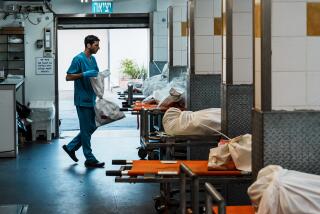Another Grisly Discovery in Iraq
- Share via
BAGHDAD — When they saw the boxes in the street, villagers feared the worst: bombs or props for an ambush. The boxes’ content, however, was grisly, not explosive. Inside, officers found the decomposing heads of nine men, each inside a black plastic bag.
The discovery Tuesday was the second of its kind near the city of Baqubah in recent days, according to police.
As Iraqi politicians have continued to bicker over who should be named to the new government’s top security jobs, killings and brutality have escalated across the country, claiming thousands of lives since December elections.
In Baqubah, a mixed city north of the capital, slayings and attacks against Iraqi security forces have recently soared. On Saturday, eight other heads were found in banana crates near the city. One of the heads was wrapped like a present. None of the bodies have been found.
But Baghdad continues to be the epicenter of violence.
On Tuesday, authorities reported that a car bomb went off near a funeral in a southwestern neighborhood, killing six people and injuring 18. In a different part of town, a roadside bomb exploded at a bus stop, killing one woman and wounding two men.
Earlier in the day, the principal of Hamza primary school, Amer Azzawi, a Sunni Muslim, was driving with his Shiite Muslim assistant, Suaad Rubaie, when a drive-by gunman killed them. They were slain in the vast Shiite slum of Sadr City in the eastern part of the capital.
On the west side of Baghdad, police found the body of a young woman who had been shot several times.
Meanwhile, the U.S. military announced that an American soldier with the 49th Military Police Brigade was killed Monday evening when insurgents attacked his convoy with an improvised explosive device in the capital.
In a news conference Tuesday, Prime Minister Nouri Maliki promised to implement a new security plan for Baghdad soon but refused to provide details. Maliki instead focused on the release of 2,500 detainees from Iraqi- and U.S.-run prisons as part of a campaign of “national reconciliation.”
However, the country has seemingly continued to splinter since the parliamentary elections.
Basra, a key port city in the south close to the Iranian and Kuwaiti borders, has recently become a problem area, with violence exploding between competing Shiite factions. After a recent visit, Maliki imposed a monthlong state of emergency in the city.
West of Baghdad, in Ramadi, described as the “philosophical heart of the insurgency” by U.S. commanders, insurgents continue to attack U.S. troops on a daily basis. Several neighborhoods are controlled by insurgents, according to residents. The U.S. military recently deployed 1,500 additional troops to Al Anbar province, of which Ramadi is the capital.
On Tuesday, the U.S. military announced that Iraqi soldiers had taken over from American troops in Habbaniya, a town in Al Anbar province between Fallouja and Ramadi.
It was the first division-level transfer of authority in the western province, according to the military.
However, there as elsewhere, American-led troops will continue to provide logistical aid to the Iraqi soldiers, including medical evacuation and aerial support.
*
Times staff writer Saif Rasheed contributed to this report.
More to Read
Sign up for Essential California
The most important California stories and recommendations in your inbox every morning.
You may occasionally receive promotional content from the Los Angeles Times.













